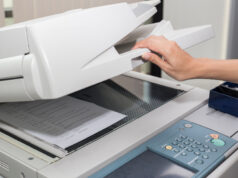New technologies are having an increasing impact on various sectors of our life. The growing popularity of blockchain technology is an obvious example of this. The ability to control counterfeiting, track goods, and gain access to information on the manufacturing process are just some of the benefits of using blockchain technology. This article attempts to answer the questions of what blockchain is and how it is used in many spheres of our lives.

How blockchain operates
Blockchain is a data collection technology that can be graphically compared to a book of accounts. However, unlike a traditional ledger, you cannot tear out a page in it, as the data recorded remains in it forever and cannot be deleted. In other words, this is a digital, decentralized, peer-to-peer block database that contains detailed, chronologically structured, and immutable information relating to a transaction. Blockchain technology ensures access to the full transaction history related to a given transaction, including the dates on which the relevant actions took place. Each new action, such as a change of product ownership, is automatically written into a digital registry.
The potential use of blockchain
The most widely known examples of blockchain technology use are Bitcoin and other cryptocurrencies that are actively bought on platforms like Paybis. Yet blockchain is so much more than just the crypto industry. This is an extremely fascinating technology, recognized in many industries, ranging from legal services to healthcare, commerce, and even state administration. However, there are many applications in which blockchain can be used successfully including banking, healthcare, transportation, and real estate. Blockchain can even be used for conducting elections.
- Technical innovations in logistics
Blockchain is used as an electronic waybill, meaning that it is now possible to track the entire delivery route of goods from the supplier to the buyer. This system can replace the traditional CRM system, i.e. the international consignment note management system. The CRM system is susceptible to hacking, changing, or deleting data. Once placed on an open blockchain, the information remains in it and cannot be deleted. Another example of an organization that uses blockchain as a bill of lading is the shipping company Alibaba, which is affiliated with the well-known Chinese shopping website AliExpress. The same principle of blockchain is used by major apparel brands, which can thus control the entire delivery process.
- Challenging counterfeits with the help of blockchain
Blockchain technology does an excellent job of detecting counterfeit goods. This problem most often affects manufacturers of luxury goods. In addition, consumers also tend to question the authenticity of goods. By using blockchain to verify the authenticity of goods, both the brand and the customer can be protected. The Aurora platform was developed by LVMH, Microsoft, and Consensus using this technology to help luxury businesses monitor and track goods. Nearly 60 brands owned by the LVMH Group use blockchain technology, and there are plans to expand blockchain functionality to protect intellectual property and curb advertising fraud.
- Jewelry business and blockchain
The jewelry sector is also using blockchain-based authentication. It has been introduced by Tracr, a platform created for the diamond mining industry. The application uses blockchain technology which allows users to authenticate natural diamonds by assigning each one a unique number. The origin and linked transactions of a registered diamond with this digital number can be verified to identify it.
- Cryptocurrency in e-commerce
There are many questions about cryptocurrencies that are critical to the credibility of economic transactions involving those assets, particularly concerning their legal nature and related tax issues. Nevertheless, they are very useful for shoppers and online shop owners as cryptocurrency payments in online shops are already becoming commonplace.
- The future of blockchain
Blockchain technology has been around for more than a decade. However, it is still a novelty in many countries and its use needs to be more regulated by law. What is more, blockchain is a challenge for lawmakers and practitioners alike, requiring new legal solutions, new legal skills, and collaboration between the legal and IT communities to create and enforce the law. The future will show whether blockchain technology will revolutionize commerce globally, until then, we’ll keep you informed.








![Excel cannot Open the File Because the Extension is not Valid Error [Fix 2024]](https://www.techpreview.org/wp-content/uploads/2024/04/Excel-cannot-Open-the-File-Because-the-Extension-is-not-Valid-Error-238x178.jpg)









